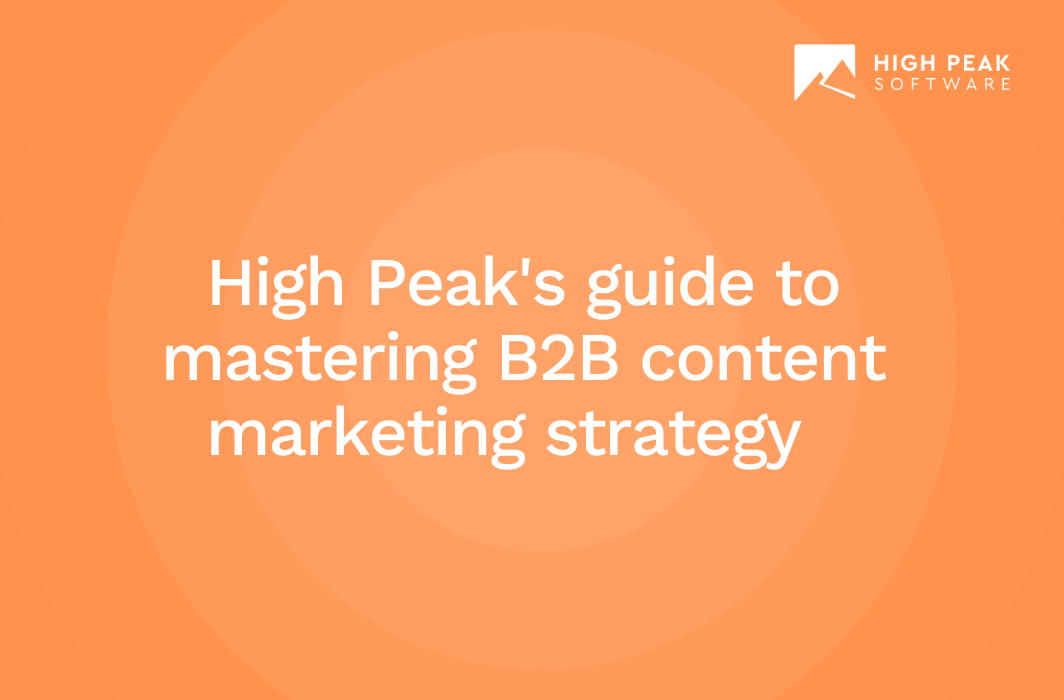High Peak’s guide to mastering B2B content marketing strategy
Ayaan Bhattacharjee
Content Writer

Table of Contents
- What is a content marketing strategy?
- How to develop a B2B content marketing strategy
- Developing buyer personas for a focused B2B content marketing strategy
- Integrating content strategy with buyer personas
- Marketing funnel stages and content creation
- Adjusting your content to match your product and market
- Application of buyer personas in B2B marketing
- Step-by-step content prioritization and development
- Ongoing strategy management
- Sounds like a lot? Let High Peak boost your B2B content marketing strategy
Struggling to bridge the gap between your content and your business audience? Crafting a B2B content marketing strategy can often feel like navigating a maze with no clear exit. Our guide outlines the blueprint for creating an effective B2B content marketing strategy. It targets key facets such as understanding your audience, content planning, execution, and measuring success. Let High Peak simplify the process and ensure your strategy aligns with business objectives.
What is a content marketing strategy?
A content marketing strategy effectively outlines how to engage and convert an audience through valuable content. It involves understanding market needs, setting clear goals, and determining the optimal content types to convey the brand’s message. Proper planning and agile execution are crucial to adapt to consumer preferences and market trends.
Instead of simply producing content, the strategy ensures every piece serves a specific purpose. This moves the audience towards subscribing, purchasing or engaging more deeply with the brand. Various content formats like blogs, videos, podcasts, and social media posts are used to build meaningful connections. They foster trust and establish brand authority.
Focusing on a B2B content marketing strategy, the approach shifts to meet more complex needs. B2B buyers look for in-depth expertise and solutions to intricate issues. Therefore, B2B content marketing strategies prioritize thought leadership, detailed guides, case studies, and whitepapers that tackle specific industry concerns. This tailored approach demands a profound understanding of the business customer’s journey, pinpointing content impact points.
The aim extends beyond lead generation to nurturing leads through a prolonged sales cycle. By delivering insightful and research-driven content, businesses underline their value proposition. Thus, it helps them stand out in a competitive field and cultivate enduring client relationships. Read more about content marketing strategy services.
How to develop a B2B content marketing strategy
Do you know that approximately 34% of marketers release new content several times each week? A successful B2B content marketing strategy hinges on understanding your audience, differentiating from the competition, and creating tailored content. Let’s se how it’s done:-
Understanding the business and product core
Before developing a B2B content marketing strategy, it’s crucial to understand the business aspects. These include the services or products a company aims to market through its B2B content marketing strategies. Engaging with various internal teams can provide a holistic view. For instance, discussions with product, sales, and executive teams, which include CEOs and C-suite executives, are vital for a comprehensive B2B content marketing strategy.
The sales team can offer insights into their tactics and targets. The product team provides details about the product functionalities. Meanwhile, data science teams explain how they manage and interpret data. By communicating with these teams, one can create a digital content marketing strategy that aligns with the business goals.
Conducting thorough competitive research
A detailed understanding of the market landscape is an important part of any B2B content marketing strategy. Identifying where your business stands compared to competitors is vital. Assess how competitors are performing and what unique offerings they have. If products are similar, find ways to differentiate them. Through competition analysis, businesses can fine-tune their B2B content marketing strategies to stand out in the marketplace.
Defining buyer personas and market segmentation
In crafting a B2B content marketing strategy, knowing your buyer personas is key. Who are they? What defines them? Unpacking demographics, geographies, decision-makers, and influencers is critical. If buyer personas are not already in place, then establishing them is essential. This ensures that your content marketing strategy aligns with target customers. As persona-based marketing is effective, it informs the overall B2B content marketing strategies.
Aligning content with buyer needs and habits
Bringing a digital content marketing strategy full circle means considering buyer personas’ preferences. Understand what content decision-makers read, where they consume it, and their preferred formats. These preferences help assumptions about content types for engaging targets. Tailoring content length and format to these buyer personas enhances the B2B content marketing strategy’s effectiveness.
Developing buyer personas for a focused B2B content marketing strategy
Creating buyer personas is the first step in formulating an effective B2B content marketing strategy. These profiles represent your ideal clients, fashioned from actual customer data and detailed market research. They crystallize the needs, behaviors, and decision-making processes of your target audience. With clear personas, your B2B content marketing strategies become more targeted and impactful.
Understanding the critical role of buyer personas
A buyer persona informs every aspect of your content marketing strategy. Understanding who your content is for guides its creation, delivery, and optimization. Solid personas are not just helpful; they are critical to a successful B2B content marketing strategy.
Key components of effective buyer personae
Detailed buyer personas address key consumer challenges. They pinpoint the precise problems that your potential clients need to solve.
- Identifying customer pain points: A core component of a buyer persona is its emphasis on the specific problems that your potential clients are seeking to resolve. This allows you to tailor your solutions and content directly to their needs.
- Recognizing persona touchpoints: It’s essential to identify the digital spaces and devices your customers use. Doing so ensures that your content is present where your personas are most active and receptive.
- Assessing daily challenges and triggers: By understanding the daily hurdles and what compels or deters your personas from seeking solutions, you can shape your content to better address their concerns and motivations.
Integrating content strategy with buyer personas
The integration of buyer personas into your content strategy is necessary for targeted messaging and strategy execution. This connection is essential for developing marketing that resonates with your audience on a personal level and drives engagement.
Crafting scenarios to enhance persona insights
Developing scenarios like “a day in the life of” each persona can yield deeper insights into their daily experience and decision-making process. This practice can guide the creation of more meaningful and effective content that truly connects with your target audience.
Initiating persona-based strategies in your organization
Bringing the concept of buyer personas to a company that hasn’t used them before can be transformative. When you implement this approach, you refine marketing strategies and deepen the understanding of customer needs. Thus leading to more successful marketing outcomes
Thus, a thoughtful B2B content marketing strategy centers on your audience. By developing detailed buyer personas, your business is positioned to engage meaningfully. It integrates these personas into your content strategy. This approach delivers solutions that resonate. It also achieves sustainable success in the digital marketplace.
Also read: How to leverage AI in content marketing
Marketing funnel stages and content creation
Crafting an end-to-end B2B content marketing strategy requires an intricate balance of awareness, engagement, and conversion tactics. As a seasoned B2B content strategist, one must navigate through the marketing funnel stages with precision, tailoring content for maximal impact at every juncture.
Stages definition
Efficiency in a B2B content marketing strategy begins with dissecting the marketing funnel into clear, actionable stages. Each stage corresponds to a distinct mindset of the prospect and demands specific content deliverables.
- Awareness Stage: This initial stage focuses on reaching those who may not yet recognize your company or the potential of your solutions. The strategy here isn’t to sell but to inform and educate.
- Interest Stage: At this juncture, prospects are digesting the fact that your offerings could aid them in some significant way. Here, the B2B content marketing strategy shifts towards engagement and nurturing.
- Evaluation Stage: The most crucial for a B2B content marketing strategy, this is where leads are actively comparing your solutions against alternatives. It’s pivotal to clinch the deal with compelling and persuasive content.
Content tailoring for each stage
A B2B content marketing strategy must be closely aligned with the prospects’ expectations at each stage to be effective.
- Awareness Content: Articles, infographics, and videos that outline industry landscape and beginner-level knowledge about your offerings belong here. The goal of a B2B content marketing strategy at this stage is to build brand recall and trust.
- Interest Content: This involves a deep dive into the advantages of your solutions, perhaps through webinars or detailed guides. The B2B content marketing strategies here are centered around showing your product as a solution to pain points.
- Evaluation Content: Here, your digital content marketing strategy must deploy its heaviest artillery. This includes case studies, in-depth comparisons, and testimonials that collectively nudge the prospect towards a confident decision.
Adjusting your content to match your product and market
Your B2B content marketing strategy should be flexible. It needs to respond to both the product lifecycle and where your company sits in the competitive landscape. This adaptive approach delivers content that hits home with your audience every time.
Lead with education for new tech products
For trailblazing products such as Gen AI, the goal is clarity. Complex ideas need simple explanations. You want content that sheds light on the tech. Answer the key questions: why it matters and how it works. This helps build interest and gets your audience talking.
Show proven value for established brands
With industry leaders like Accenture, your strategy should highlight a track record of success. Share stories of how your products have helped others. Use case studies, testimonials, and expert articles to build trust. Show new clients why your brand is a safe and smart choice.
Blend strategies for mid-sized companies
If you’re not the biggest name out there, your strategy needs to be smarter. Pay attention to what your market wants and needs. Sometimes, educational pieces will work best. Other times dive straight into showing off the benefits of your products or services. Stay on your toes and be ready to shift your approach based on feedback and market trends.
To succeed, a B2B content marketing strategy must understand the marketing funnel. It should create and share content thoughtfully. The aim is to connect with the right people at the right time in their decision-making process.
Application of buyer personas in B2B marketing
Creating a robust B2B content marketing strategy is crucial for effective engagement with your target audience. By understanding and mapping your buyer personas, you can create content that caters to their specific needs. This approach improves engagement and heightens conversion rates. Let’s see the details:-
Tailoring content to individual personas
Personas should be meticulously mapped to content types that guide them through the marketing funnel. Each content piece should address its unique pain points and decision-making criteria. Ensuring the content is relevant and engaging is key.
Creating content that aligns with persona needs
By crafting buyer personas and aligning content with their needs at every funnel stage, companies can lead customers from awareness to decisions. This personalized content approach increases engagement rates. It also boosts conversion rates.
Strategizing nuanced B2B content for distinct audiences
Developing a nuanced content marketing strategy is essential for targeting key audience segments—decision-makers and decision influencers. It requires deep audience understanding. The best strategies to reach them must be implemented.
By allocating 80% of general content for decision influencers and 20% for decision-makers and inverting these ratios for sales-specific content, you can cater to their influence in the purchasing process. This method recognizes the stages of customer engagement: awareness, interest, and evaluation. Content is then tailored to maximize impact.
For strategic alignment of content, consider crafting titles for varying audience interests and engagement stages. These titles should capture organic traffic and support the sales process. Insight-led and data-driven themes that resonate with decision-makers and influencers are effective. This tailored approach ensures your B2B content marketing strategy is relevant and impactful.
Examples of focused titles based on target audience
For decision influencers (80% of general content):
- Navigating the future of industry X: insights for tomorrow’s leaders
- Bridging technology and strategy: a guide for mid-level managers
- Innovative approaches to solving common industry problems
- Building a case for change: convincing your executives made easy
- Industry trends that will shape the next decade
For decision makers (20% of general content):
- Maximizing ROI in technology investments: a C-suite perspective
- Leading through innovation: executives shaping the future of industry X
- Strategic decision making: harnessing data and insights
- The future of work: preparing your organization for tomorrow
Specialized sales team content (90% for decision makers):
- Exclusive insights: navigating market changes for industry leaders
- Strategic leadership: driving growth in uncertain times
- The competitive advantage of early adoption in emerging technologies
Content for both audiences:
- From insights to action: a joint roadmap for executives and their teams
- Collaborative innovation: how decision makers and influencers shape success together
To generate these topics, consider leveraging the strategies you’ve outlined. Strategies such as employing SEMrush and Ahrefs for SEO and competition analysis. Also, directly engage with your top clientele for insights and testimonials. This ensures your B2B content marketing strategy is grounded in data and trending subjects. It also becomes deeply resonant with your audience’s current interests and challenges.
When drawing insights from clients and third-party tools, aim for a mix of qualitative and quantitative data. Direct feedback can reveal the context and motivations behind engagement with your content marketing strategy and services. Meanwhile, SEO tools highlight broader interest trends and gaps your digital content marketing strategy can fill.
Finally, validate your strategy and topic selection with leadership. Their perspective can confirm the alignment with overall business goals and provide additional insight. This ensures your B2B content marketing strategies are robust, relevant, and positioned for success.
The process of eliminating irrelevant content and honing in on the impactful themes is indeed an iterative one. It requires a blend of experience, product knowledge, and continuous learning. Here are some suggested steps for this ongoing process of content optimization and prioritization
Step-by-step content prioritization and development
Developing a B2B content marketing strategy that stands out requires meticulous planning and precision. Here’s a breakdown of how businesses can prioritize and develop their content strategically to ensure relevance and impact. Let’s see the details:
Eliminate irrelevant keywords and content
A robust B2B content marketing strategy begins with eliminating irrelevant keywords and content. Marketers must use their understanding of the product and audience to determine relevance. They then refine their approach using analytics and audience feedback. This step ensures that the content strategy stays focused and effective.
Stakeholder approval
Alignment with business goals is critical. Every B2B content marketing strategy requires the green light from key stakeholders. This ensures that content objectives are in sync with the company’s vision and goals. Stakeholder endorsement is crucial before any content production begins.
Prioritization of content themes
The next step is to determine the main themes of your B2B content marketing strategy. This should be in collaboration with senior management and align with the Customer Lifecycle Continuum. Themes should resonate with target personas and the company’s strategic aims. They help guide content creation towards addressing specific interests and needs.
Keyword cohort development
Once themes are set, it’s time to group relevant keywords. This involves research beyond the surface level. It includes analyzing competitors and finding keywords that offer a chance to stand out. Strategic keyword selection is vital in setting a B2B content marketing strategy apart.
Analyzing the competition
Understanding what competitors are doing well can inform your B2B content marketing strategy. This involves examining their content and identifying successful formats and titles. These insights help in shaping a unique and effective strategy. They aid in differentiating your content in the market.
Content outline and asset type decision
After the analytical groundwork, develop precise content outlines. These should address the identified themes and target customer pain points. Next, decide on suitable formats for content delivery. Consider what formats—visual, written, audio—best fit the audience’s consumption habits. This step is crucial in creating content that engages and converts.
In short, a targeted B2B content marketing strategy is pivotal for B2B marketers looking to make a substantial impact. Following these steps without deviation or repetition ensures content that is relevant and powerful. The strategy must mirror business objectives and cater authentically to the audience’s needs. An effective B2B content marketing strategy positions a company as an industry leader. It does so by fostering a connection with its audience and delivering measurable business results.
Ongoing strategy management
In managing a B2B content marketing strategy, adopting a proactive approach is key. The digital world moves swiftly, and a static strategy is a sure path to obsolescence. It’s essential to keep a finger on the pulse of market trends and make judicious adjustments to our strategy accordingly.
Refresh and adapt content strategy
Regular auditing of a company’s content strategy is essential for maintaining effectiveness. This process involves examining whether the content still addresses the evolving needs and challenges of the audience. As the company’s direction shifts, businesses should embrace flexibility. They should adjust their narrative and ensure their content assets reflect any rebranding, new products, or changes in the market. This helps sustain the content’s connection with B2B customers and maintains a competitive edge.
Maintain a solid content foundation
Innovation is important, yet there is also value in nurturing the perennial aspects of content that have consistently performed well. For mature businesses, making minor adjustments can be enough. This preserves a consistent brand voice and messaging framework. Conversely, startups or businesses in sectors with rapid change may need more aggressive overhauls. This balance ensures that the core content remains strong and credible.
Usage of analytics for informed updates
Data serves as the guiding star for content strategy. By continually analyzing analytics, companies can uncover insights into the effectiveness of their content. Metrics such as engagement, conversion rates, and user feedback are key to optimizing content offerings. Utilizing this data helps inform strategic decisions, such as refining topics and removing content that doesn’t perform well. Through careful analysis, B2B content marketing strategies stay pertinent, resourceful, and polished over time.
By following these steps, you create a dynamic content strategy that is both grounded in solid research and flexible enough to adapt to changes. This approach ensures that content remains relevant and engaging, even as business strategies evolve and market dynamics shift. Remember to keep the lines of communication open with all involved stakeholders and to continue monitoring industry trends and competitor activities to refine your content strategy effectively.
Sounds like a lot? Let High Peak boost your B2B content marketing strategy
Leveraging content effectively to elevate your B2B content marketing strategy can be daunting. With the ever-evolving market demands and trends, this task requires a nuanced approach. Sounds like a lot to handle? Let High Peak take the reins. We specialize in boosting your B2B content marketing strategy to new heights. Contact us today and boost your marketing!




